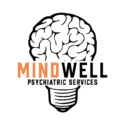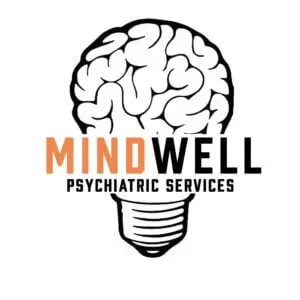Obsessive-Compulsive Disorder, or OCD, is when people can’t stop thinking certain thoughts or feel they must do the same things over and over. These thoughts and actions can take up a lot of time and make everyday life tough. So, it’s really important to understand OCD and how it affects people.
At Mindwell Psychiatric Services, we believe taking care of your mind is very important. OCD isn’t just about liking things clean or in order. It’s a real problem that people need help with. That’s why finding good help matters. We’re here to provide that help, with the right care and treatments to improve the lives of those with OCD.
Understanding Obsessive-Compulsive Disorder
OCD is when people can’t stop thinking about certain worries or feel they must do things over and over. Imagine your brain stuck on repeat.
What's Obsessive-Compulsive Disorder?
OCD causes big worries about things like dirt or making sure everything’s just right. These worries are called obsessions. To try to stop worrying, people with OCD might wash their hands a lot or check things many times. These actions are called compulsions.
How OCD Changes Things
Having OCD can be really hard. It can take up so much time and make normal stuff difficult. People might be late because they’re stuck doing their actions, or they might not join in on fun stuff because they’re scared. This can make enjoying life and hanging out with friends or family hard.
Things to Know About Obsessive-Compulsive Disorder
Who Gets It
Think of a big group of 100 people in the U.S. – about 2 or 3 of them will have OCD sometime in their life. That’s a lot of people! Most often, teenagers or young adults start to notice it, but kids can have OCD too. It doesn’t matter if you’re a boy or a girl, it can happen to anyone.
Even kids and teenagers can have OCD. About 1 in every 200 young folks might have it. Sometimes what we think is just being scared a lot or having to do things a certain way really often might actually be OCD.
It's Everywhere
OCD isn’t just in one place; it’s all around the world. For every 100 people you meet from different places, about 1.2 might have OCD. Dealing with OCD can be hard, not just because it makes you feel certain ways, but it can also make you miss out on work or school. And sometimes, you might need to go see a doctor or someone who can talk with you about how you’re feeling, which can cost money.
It Can Run in Families
If someone in your family has OCD, like a parent, brother, or sister, there’s a chance you might have it too. Scientists have found that some parts of the brain are a bit more active or work differently in people with OCD. They’re still trying to learn why this happens.
Knowing about OCD helps us support and understand people who have it. It shows us that it’s a common thing and nobody has to go through it alone.
Risk Factors for Obsessive-Compulsive Disorder
What makes someone more likely to get OCD? Even though we don’t know exactly why people get OCD, there are a few things that can make it more likely.
Family
If your mom, dad, brother, or sister has OCD, you might be more likely to get it too. Scientists are still trying to find out if there are special genes that make OCD more likely.
Brain
Pictures of the brain show that some parts might work differently in people with OCD. These parts are important for controlling what we do and how we feel. Scientists are working hard to learn more about how these brain parts relate to OCD. This could help them figure out better ways to help people with OCD.
Personality
People who are often very careful, feel a lot of strong emotions, or get worried and sad easily when they’re kids might have a higher chance of getting OCD.
Tough Times in Childhood
Some research says that hard or scary experiences when you’re little might be linked to OCD later on. But, we need more studies to really understand this link.
Understanding these factors can help us know more about OCD and how to support people who have it.
Exploring OCD: Traits and Impacts Simplified
Obsessive-Compulsive Disorder (OCD) is a mental health condition characterized by the presence of obsessions and compulsions.
It can manifest differently in individuals, but here are some common features and behaviors associated with OCD:
1. Obsessions
Intrusive and persistent thoughts, images, or urges that cause distress or anxiety.
Examples of obsessions include fears of contamination, doubts about safety, aggressive or taboo thoughts, or the need for symmetry and order.
2. Compulsions
Repetitive behaviors or mental acts performed in response to the obsessions to reduce anxiety or prevent a feared event.
These actions are often excessive and not connected in a realistic way to the feared event.
Common compulsions include washing, checking, counting, repeating, and arranging objects.
3. Time-consuming
OCD can be time-consuming because individuals may feel compelled to perform their rituals or mental acts repeatedly until they feel the anxiety has lessened or the obsession is no longer present.
4. Interference with daily life
OCD can significantly interfere with a person’s ability to function in their daily life, including work, school, relationships, and self-care.
OCD can significantly interfere with a person’s ability to function in their daily life, including work, school, relationships, and self-care.
5. Distress
People with OCD often experience significant distress and impairment due to their obsessions and compulsions.
6. Insight
Some individuals with OCD recognize that their obsessions and compulsions are excessive or irrational (insightful OCD), while others may not have this insight (non-insightful OCD).
7. Avoidance
People with OCD may avoid situations or places that trigger their obsessions or compulsions, which can limit their activities and social interactions.
8. Variability
The specific obsessions and compulsions can vary greatly from one individual to another. While some may have primarily cleaning-related obsessions and compulsions, others may focus on symmetry or harm-related obsessions.
9. Severity
OCD can range from mild to severe. In severe cases, it can be highly debilitating and disrupt a person’s life to a significant extent.
It’s important to note that OCD is a complex and heterogeneous condition, and not all individuals will display all of these symptoms. Additionally, OCD can co-occur with other mental health disorders, such as anxiety or depression, which can further complicate the clinical picture.
Diagnosing Obsessive-Compulsive Disorder
Finding out if someone has Obsessive-Compulsive Disorder, or OCD, involves a few steps. It’s important to get this right so people can get the help they need. Let’s talk about how doctors figure out if someone has OCD and why places like Mindwell Psychiatric Services are key in this process.
Understanding the Signs
First, doctors look for signs of OCD. This means they check if someone has thoughts that bother them a lot (obsessions) and if they do certain things over and over (compulsions) to try to make these thoughts go away. For instance, someone might wash their hands many times because they’re really worried about germs.
Talking About Feelings and Actions Diagnosis
Next, a mental health in Nevada or therapist will chat with the person about what they’re going through. They’ll ask about the worries they have and what they do to try to feel better. This talk helps the doctor understand how much these thoughts and actions are affecting the person’s life.
Checking the Rules for OCD
Doctors use special lists of symptoms to see if someone has OCD. They make sure the person’s experiences match these symptoms. It’s like having a checklist to help figure out if it’s really OCD.
Why Professional Help Matters
This is where places like Mindwell Psychiatric Services come in. They have professional psychiatric services in Las Vegas, NV that can help a lot with OCD. These experts can make sure the diagnosis is right. They understand the best ways to help and can guide people to treatments that can make a big difference.
More Than Just a Chat
Sometimes, doctors might ask someone to fill out a questionnaire about their thoughts and actions. This helps give a clearer picture of what’s going on. They might also talk to family members to get a better understanding of how the person’s life is being affected.
Making Sure It's OCD
Doctors also check to make sure the symptoms aren’t caused by something else, like another health issue or medicine someone is taking. It’s important to rule out these other causes to be sure it’s really OCD.
Planning the Next Steps
After figuring out someone has OCD, the next step is to talk about the best ways to help. For instance, this might include therapy, medicine, or both. The goal is to help the person manage their OCD so it doesn’t control their life.
Treatment Options for Obsessive-Compulsive Disorder
Treating OCD helps a lot of people, even those with really tough cases. Experts like doctors and therapists use different ways to help, like talking therapies, medicine, or both together. They can help you pick the best treatment and tell you about the good and not-so-good sides of each.
Sticking to your treatment plan is key because both talking therapies and medicines need some time to start working. While there isn’t a complete cure for OCD, treatments can really help people handle their symptoms, do everyday things, and enjoy life.
Talking Therapy
Talking therapy can work well for both grown-ups and kids with OCD. Studies say that certain talking therapies, like cognitive behavioral therapy (CBT) and others, can work as well as medicine for many folks. Sometimes, talking therapy works even better when used with medicine.
Cognitive behavioral therapy (CBT)
This is a type of talking therapy that helps people see and change unhelpful thoughts. It teaches you to question these thoughts, see how they affect your feelings and what you do, and change actions that aren’t helpful. CBT is especially good for OCD because it’s made to fit the exact problems OCD brings.
Exposure and response prevention therapy (ERP)
This is a special kind of CBT that really helps reduce the need to do things over and over, even if medicines didn’t help before. In ERP, you’ll face things that make you anxious in a safe way, without doing the usual actions to lessen the anxiety. At first, this can make you feel more anxious, and some people might want to stop the therapy too soon. But if you keep going, most people see their symptoms get better.
Kids with OCD might need extra help from their families and doctors to handle their symptoms. So, professionals can work with kids to find ways to manage stress and get more support to control their OCD symptoms.
Medicine
Doctors might give medicine to help with OCD. For instance, the most common medicines are antidepressants that focus on serotonin, a brain chemical that has a lot to do with OCD and feeling down. The main group of these medicines is called selective serotonin reuptake inhibitors.
It can take about 8 to 12 weeks for these medicines to start making a difference, and sometimes the dose for OCD is higher than for feeling down. Some people might get side effects like headaches, feeling sick, or trouble sleeping. But many find that medicine, often along with talking therapy, helps them manage their OCD.
Your doctor can change the dose of your medicine to help reduce side effects or withdrawal symptoms. Always talk to your doctor before stopping your medicine. So, they can help you keep an eye on your health and change your treatment plan in a safe way.
Effective OCD Treatment: Boosting Work and Enhancing Relationships
Treatment options for OCD typically include cognitive-behavioral therapy (CBT), medication, or a combination of both, and individuals with OCD are encouraged to seek professional help for proper diagnosis and management.
When Obsessive-Compulsive Disorder (OCD) is properly treated, individuals can experience significant improvements in their work life and relationships. Proper treatment usually involves a combination of therapy and, in some cases, medication prescription and management in Las Vegas, NV.
Here’s what work life and relationships can look like when OCD
is effectively managed:
1. Improved Work Life
Increased Productivity
With effective treatment, individuals with OCD can experience reduced interference from obsessions and compulsions, allowing them to focus more on their work tasks and be more productive.
Better Concentration
As anxiety and intrusive thoughts decrease, individuals may find it easier to concentrate on their work and complete tasks efficiently.
Reduced Absenteeism
Properly treated OCD may lead to fewer missed days at work due to the disorder’s symptoms, such as excessive rituals or avoidance behaviors.
Enhanced Job Satisfaction
With reduced anxiety and distress, individuals are more likely to enjoy their work and feel a sense of accomplishment in their roles.
2. Improved Relationships
Reduced Interpersonal Strain
When OCD is properly managed, individuals can be more emotionally available and less preoccupied with their obsessions and compulsions, leading to healthier and less strained relationships.
Increased Social Engagement
Effective treatment can help individuals overcome the avoidance behaviors often associated with OCD, allowing them to engage more fully in social activities and maintain friendships.
Better Communication
Improved mental health can lead to better communication skills, helping individuals express their thoughts and feelings more effectively in their relationships.
Less Burden on Loved Ones
Loved ones often play a supportive role in helping individuals with OCD access treatment and cope with their symptoms. Also, effective treatment can reduce the burden on family members and friends.
3. Enhanced Quality of Life
Increased Independence
Properly treated OCD can lead to increased independence as individuals are better equipped to manage their symptoms on their own.
Greater Life Satisfaction
A reduction in OCD-related distress and anxiety can contribute to an overall sense of well-being and life satisfaction.
More Opportunities
Improved mental health can open up new opportunities in various areas of life, including career advancement, education, and personal growth.
While treatment can really help improve life for people with OCD, it doesn’t completely cure it. Some might still have tough times, especially when stressed, but learning the right ways to deal with these moments and keeping up with treatment helps a lot.
Getting advice from a therapist or psychiatrists in Las Vegas who knows a lot about OCD is key. After that, they can come up with a plan that’s just for you. Cognitive-behavioral therapy (CBT), which includes exercises to face fears directly, is a common and helpful treatment.
Sometimes, doctors also suggest certain medications to help along with therapy.
The most important thing is to make sure the treatment fits you personally and to check in on how it’s going regularly.
Conclusion
In conclusion, treating OCD is very possible and can make a big difference in someone’s life. Whether it’s through talking with a therapist, using medicines, or both, there are many ways to help manage the symptoms of OCD. Above all, following the treatment plan your doctor or therapist gives you is important because it might take a little time to see changes. But with patience and the right support, people with OCD can do their everyday activities and enjoy life more.
At Mindwell Psychiatric Services, we’re here to support you every step of the way. So, from figuring out if you have OCD to finding the best treatment plan for you, our team is dedicated to helping you feel better. Remember, you’re not alone in this journey. Therefore, with the right help managing OCD is possible, and we’re here to help you live a fuller, more active life.
FAQs
What is Obsessive-Compulsive Disorder?
OCD is when a person has certain worries that stick around (obsessions) and feels they have to do certain things over and over (compulsions) to try to make these worries go away.
How do I know if I have OCD?
If you find yourself stuck on certain worries a lot and doing things repeatedly to try to feel better (like washing hands many times because you’re scared of germs), it might be OCD. A doctor or therapist can talk with you to figure out if it’s OCD.
Can kids have OCD too?
Yes, kids can have OCD just like adults. Also, sometimes what we think is just kids being kids like being very scared of something or having to do things a certain way might actually be signs of OCD.
Does treatment for OCD really work?
Yes, treatments like talking therapies (especially one called CBT) and medicines can really help people manage their OCD symptoms. It might take some time to see changes, so it’s important to keep going with the treatment plan.
What should I do if I think I have OCD?
The best first step is to talk to a doctor or a therapist who knows a lot about OCD. So, they can help you understand what’s going on and talk about the best ways to help you feel better.





